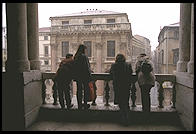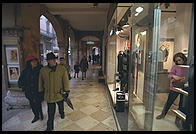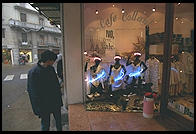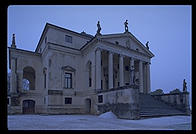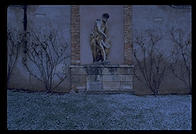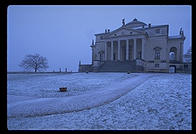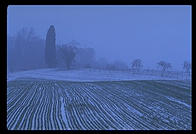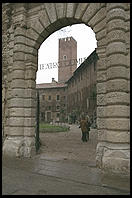 Vicenza, the home and shrine of architect and architecture author Andrea di
Pietro della Gondola ("Palladio") (1508-80), is about one hour's drive from
either Venice or Verona. Although the real Vicenza is a fairly large wealthy
industrial sprawl, the old center is a beautiful place for a tourist. A good
place to start a tour is the parking lot opposite the Teatro Olimpico. This was
Palladio's last project, which opened after he died with a 1585 performance of
Sophocles's Oedipus Rex. Perfectly preserved, the semicircular
indoor theater recalls the design of ancient Greek venues.
Vicenza, the home and shrine of architect and architecture author Andrea di
Pietro della Gondola ("Palladio") (1508-80), is about one hour's drive from
either Venice or Verona. Although the real Vicenza is a fairly large wealthy
industrial sprawl, the old center is a beautiful place for a tourist. A good
place to start a tour is the parking lot opposite the Teatro Olimpico. This was
Palladio's last project, which opened after he died with a 1585 performance of
Sophocles's Oedipus Rex. Perfectly preserved, the semicircular
indoor theater recalls the design of ancient Greek venues.
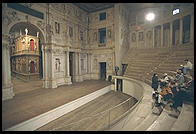
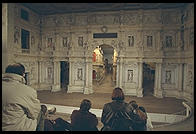
Pick up a map at the tourist office right next to the theater entrance. This
marks all of the buildings in the area that were designed by Palladio. Palladio's
popularity with the Vicentine nobility was helped by his fondness for cheap brick
covered in faux marble stucco. His reputation through the ages was ensured by his
books. Sir Reginald Blomfield, in Studies in Architecture, wrote
"With the touch of pedantry that suited the times and invested his writings with
a fallacious air of scholarship, he was the very man to summarize and classify,
and to save future generations of architects the labor of thinking for
themselves." I asked a distinguished Canadian architect whether he concurred with
Blomfield's denigration of Palladio. He responded, "Have you ever looked at one
of Palladio's buildings?"
The downtown Palladian buildings are an easy walk from the Teatro Olimpico
parking lot, including the Piazza dei Signori which contains the massive
"basilica" that the town hall going back to the 15th century but suffered from
subsidence. Palladio propped it up with a colonnade and it is therefore supposed
to be a tourist attraction.
A couple of miles out of town are some important villas, including the
Rotonda, a 1550 Palladio design. A pedestrian alley links the Rotonda's street to
the Villa Valmarana, a 1688 Antonio Muttoni design. These are only open spring
through fall so I haven't seen the interiors.
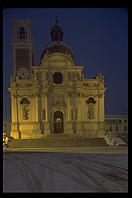 A quick drive from the villas is Monte Berico, a beautiful hill overlooking the
town. There is a Baroque church on top of the hill, dedicated to the Virgin who
"appeared on this spot during the 1426-8 plague to announce that Vicenza would be
spared."
A quick drive from the villas is Monte Berico, a beautiful hill overlooking the
town. There is a Baroque church on top of the hill, dedicated to the Virgin who
"appeared on this spot during the 1426-8 plague to announce that Vicenza would be
spared."
philg@mit.edu
 Vicenza, the home and shrine of architect and architecture author Andrea di
Pietro della Gondola ("Palladio") (1508-80), is about one hour's drive from
either Venice or Verona. Although the real Vicenza is a fairly large wealthy
industrial sprawl, the old center is a beautiful place for a tourist. A good
place to start a tour is the parking lot opposite the Teatro Olimpico. This was
Palladio's last project, which opened after he died with a 1585 performance of
Sophocles's Oedipus Rex. Perfectly preserved, the semicircular
indoor theater recalls the design of ancient Greek venues.
Vicenza, the home and shrine of architect and architecture author Andrea di
Pietro della Gondola ("Palladio") (1508-80), is about one hour's drive from
either Venice or Verona. Although the real Vicenza is a fairly large wealthy
industrial sprawl, the old center is a beautiful place for a tourist. A good
place to start a tour is the parking lot opposite the Teatro Olimpico. This was
Palladio's last project, which opened after he died with a 1585 performance of
Sophocles's Oedipus Rex. Perfectly preserved, the semicircular
indoor theater recalls the design of ancient Greek venues.

